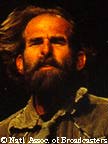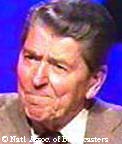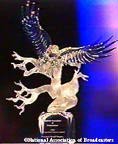The Incident. Click here for full images.







 The University of Chicago Magazine
Feb 1995
The University of Chicago Magazine
Feb 1995



"I want to thank you for giving this young fellow his start," he told an appreciative group of media executives, "and for all the other things you do for your country!"
No one in the audience could have been much surprised by anything in the address-a rambling affair in which jokes, flattery, and autobiographical reminiscences laid the ground for predictable observations on themes dear to the ex-President, his constituency, and his immediate audience: the evils of Communism and drugs, and the ways in which the Bible, the family, radio, television, and the movies can help combat them.
This was not a forum for controversy and dissension, but a stage for playing out the ritual of authority-a subtle combination of the right speaker, the right speech and delivery, the right setting and props, the right time and place, and an audience whose historically and culturally conditioned expectations establish the parameters of what is judged "right" in all these instances.
When these crucial givens combine in such a way as to produce attitudes of trust, respect, docility, acceptance-even reverence-in an audience, "authority" is the result. Authority depends on nothing so much as the trust of the audience-or the audience's strategic willingness to act as if it had such trust.
When authority is operating smoothly and efficiently, its effect often obscures this process. When that authority is disrupted-as it was during Reagan's otherwise uneventful appearance at the 1992 broadcasters' convention-those interests collaborating in its support become more easily discernible. The New York Times reported the incident as follows:
LAS VEGAS, NEV. APRIL 13 (AP)-Former President Ronald Reagan was jostled but was not harmed today when a man walked onto stage where he was speaking and smashed an honorary crystal shrine, hitting him with its shards.
After smashing the statue, which had just been given to Mr. Reagan by the National Association of Broadcasters, the man tried to speak into the microphone but was grabbed by Secret Service agents, who threw him to the ground and then took him away.
The man in question is one Rick Springer, who was most often identified in the press as a 41-year-old antinuclear activist. Since 1987, he has committed himself to the work of organizing, raising funds, and speaking out about the danger of nuclear tests, in the belief that ending tests is the first step toward abolishing nuclear weapons altogether. The task has been difficult, and although he is convinced that most people agree with him in a general way, complacency is widespread and few share his sense of urgency. Finding effective channels through which to spread his message has also been a problem, for the antinuclear issue is hardly on the agenda of the major media. But in 1990, he had an idea.
What Springer envisioned was an event mixing music and politics in the spirit of the Woodstock and Live Aid concerts. Those attracted by the music could be educated about the issue, and the spectacle would be so impressive as to ensure press coverage, through which the message could be further spread. For two years, Springer devoted his efforts to realize this idea, predicting that 500,000 people would attend and that "dozens of international speakers and world-class musical artists" would appear.
Securing such involvement and support proved difficult, however. Of the 120 performers on his original list, only one (Ritchie Havens) agreed to appear. Established organizations would not commit themselves unless they could see that all other aspects of the project were firmly in place. Choosing a location also posed problems. He ultimately opted for a setting as close as possible to the Nevada Test Site. Insurance proved expensive and permits impossible to obtain. Despite these obstacles, Springer forged ahead and laid plans for a ten-day extravaganza in April-including the concert, a communal march to the test site, and a mass protest of government offices in Las Vegas timed for Earth Day.
Gradually, some pieces fell together. Speakers were lined up and bands booked, although not the top talent he had sought. Finally, 2,000 people gathered in the desert on Friday, April 10: a respectable turnout, but far less than Springer had hoped. There was no national coverage, and even the Las Vegas paper showed little interest. Other problems were distressing. By monitoring government radio communications, Springer and his colleagues learned that a nuclear test was scheduled for April 14, when their own plans called for them to be approaching the test site. A decision was made to travel to Las Vegas on April 13 to stage a protest at the offices of the U.S. Department of Energy.
Many of the group took part in this action-26 were arrested. Some 500 others, according to plan, began their march to the test site. And, on the same day, across town at the Las Vegas Hilton, the National Association of Broadcasters convened its annual meeting, with 50,000 people from the radio and television industry in attendance.
Springer had been aware of this meeting for months. Off and on, he had thought about how he might call the antinuclear issue to the attention of the NAB, a group that, in his view, "has a deathhold on the media." He made his way to the Hilton alone, holding press credentials (obtained by a friend) that would admit him to the meeting's prime event, and he pondered just what he would do.
Arriving at the Hilton's banquet room, he found a group of 3,000 top media executives listening as NAB President Eddie Fritts presented a crystal eagle and the Association's Distinguished Service Award to Mr. Reagan for his "contributions to broadcasting and the American public." Then, to warm applause, the Great Communicator himself moved to the podium. Meanwhile, off to the side, Rick Springer wrestled with his conscience, prayed quietly, and worked up his courage. Finally, at what seemed to him an appropriate moment, he strode forward, slowly and resolutely.
Given his dress, manner, and general appearance, most people took him for a sound technician until he picked up the two-foot-high crystal eagle, raised it over his head, and-in what he later described as the "clearest, most meditative moment in my life"-smashed it to bits. Then he advanced to the podium, displaced Mr. Reagan from the microphone, and spoke four words-"Excuse me, Mr. President"-before the Secret Service laid him out.
As he was dragged away, Springer was heard to shout: "Help, there's a nuclear bomb test tomorrow." Backstage, he was handcuffed and placed under arrest, then taken to a Las Vegas jail, where he was charged with state and federal offenses. (Last autumn, Springer completed a 13-month prison sentence for destroying public property, interfering with the Secret Service, and failing to surrender.) After a minute or two, President Reagan returned and finished his speech, quipping, "Is he a Democrat, by chance?"
In a subsequent series of interviews, articles, and court appearances, Rick Springer has continued to speak out, and he has had opportunities, not only to speak, but to speak in privileged settings. Among the most interesting of these was his appearance on CBS This Morning, four days after his encounter with Mr. Reagan.
This show, which is seen in two-and-a- half-million households daily, offers a mix of news, opinion, features, entertainment, and pleasant chitchat among its regular hosts. Guests are presented for a number of reasons, and in styles that cue the audience on how each one is to be regarded. For example, when FDA Commissioner David Kessler, JD'78, was brought on as the show's first guest, his professional title and official position were emphasized, and co-host Paula Zahn gave him a warm welcome. Springer was treated somewhat differently.
Harry Smith (co-host): Antinuclear activist Rick Springer says he never had any intention of hurting former president Reagan earlier this week. Springer says he just wanted to make a point. Still, the incident startled Mr. Reagan and jolted the Secret Service....
In his introduction, Harry Smith gives basic information, while also signaling caution in different ways-for example, his repeated use of the phrase "Springer says" to preface his guest's characterizations of the incident, in juxtaposition to the reactions of more responsible observers. ("Still, the incident startled Mr. Reagan and jolted the Secret Service.") The "activist" would be given an opportunity to speak, but the host, the show, and the network were careful not to offer anything that could be construed as an endorsement of him, his actions, or what he would have to say.
Smith's first question was reasonably open-ended: "What were you trying to accomplish earlier this week?" Springer seized this opportunity to explain how he hoped to use the NAB convention to alert the country to the realities of nuclear testing. At this, Smith rapidly changed tack, and began to treat Springer himself as the story: a curiosity or "human-interest" item. His next 11 questions focused narrowly on events at the Hilton, as he tried to steer conversation away from the issue of nuclear testing.
In his answers, Springer struggled to introduce wherever possible items he thought important: the bomb test at the Nevada Test Site, France's decision to discontinue its testing program, his lifetime commitment to nonviolence. Moving to wrap things up, Smith offered one last question, which was, in effect, a call to repent and show remorse.
Smith: Do you have any regrets about what you did this week?
Springer: Well, I certainly must offer an apology to Mr. Reagan. I am very sorry that the Secret Service jostled him in an effort to get me off the stage. I have no regrets as to the fact that I approached the-the podium, and I think that the coverage that I have received due to this act is an excellent example of what it takes to wake up and startle the media and, indeed, the American public, whose apathy is responsible for the continuation of nuclear testing to this day.
When Springer's image vanished from the screen, others joined the conversation, offering their judgments, and cueing their audience on how to regard him.
Smith: Wasn't that interesting?
Zahn: I loved that segment.
Smith: Springer.
Mark McEwen (meteorologist): He could talk. Most of the time you get people like Squeaky Fromme-remember?
Smith: Well, as it turns-this guy is well-known-I don't know about well-known, but there is lots of tape of him leading nuclear-antinuclear demonstrations and stuff. I mean, that's really what this guy is all about. That's-because he was released so quickly and everybody said, "What? Excuse me?"
McEwen: Yeah.
Smith: And so he has a-he has a real track record of-of pacifism, so...
McEwen: I thought that was great. "Do you think you're going to jail?" "No, I think they're going to drop the charges," which I thought-I don't know if I would have said that. I'd say, "Oh, please-oh, please-oh, please."
Zahn: But he did apologize for hitting the former president with the shards of glass.
McEwen: Absolutely.
Smith: It's just amazing-just amazing...
Apparently, Rick Springer surprised his hosts and threw them off their script, as can be seen from the mangled syntax with which they offered their reactions. It should be noted that praise of Springer began with the member of the team who enjoys least authority, and thus has the greatest license to express unconventional opinions-the weatherman. Further, specific praises reflect a gendered division: The male host commented on Springer's principles and commitment, the female host on his courtesy, and the boyish meteorologist on his courage and powers of articulation.
In effect, after initially holding him at arm's length, the authorized spokespersons of this widely viewed show bestowed their (partial and guarded) approval of him. And this, in turn, prompted reaction from other quarters.
On April 21, the Wall Street Journal ran a particularly aggressive editorial that began by lamenting, "It was predictable, but a bit startling nonetheless, to find Rick Springer staring out at us from our TV sets." It went on to depict him in lurid prose as "the latest entry to a special galaxy of media-produced stars-people whose aberrations, disturbances and general aggressions against society have won them fame as `political activists,'" and to place him in the ranks of "political fanatics prepared to wreak whatever havoc necessary to advance their notions of humanity."
So hysterical is the rhetoric, and so obvious the financial interests being defended, one is tempted to think the Journal felt threatened by Rick Springer. But the real target of its ire becomes clear in the editorial's closing swipe: "What would be news," the Journal opined, "would be if the producers of a show such as CBS This Morning decided that giving a character like Richard Springer a place in the media spotlight wasn't smart or healthy or in the public interest. That wouldn't simply be news, of course. That would be a miracle."
Beyond any conflict of individuals or debate on issues of policy, plainly evident here is a conflict between stages that goes well beyond the familiar rivalry of print and electronic media. Both possess some authorizing capacity, but insofar as their backers, interests, and audiences diverge, so too do the specific principles of selectivity on which they operate.
Most often, these stages tolerate or ignore one another, but occasionally their differences lead to open conflict, as here, where the Wall Street Journal, an elite organ of and for capital, chastises CBS This Morning, a mildly populist middlebrow show, for what it takes to be a characteristically promiscuous and irresponsible act of authorization. The point of the struggle is not just whose speech gets authorized, but more importantly, who does the authorizing and how. In its bitching about "media-created stars," one can hear the Journal's displeasure with stars created by other media, and authorized speakers who speak others' interests.
Turning to the broader issue of whether authority in the modern world differs markedly from its ancient counterpart, the evidence at hand convinces me that authority itself remains very much what it always has been: an effect characteristic of strongly asymmetrical relations between speaker and audience, predisposing the latter to defer to the discourse of the former in ways that are often quite uncritical. This notwithstanding, within recent history there has emerged nothing less than a new mode of authority production, the central operation of which is no longer the production of speech, nor its authorization, but rather the production of stages with authorizing capacity.
In this we have moved from the situation of scarcity to one of abundance. The ancient world had relatively few authorized or authorizing places-the Greek Assembly or the Roman Senate, to use two examples. Consequently, each such site commanded the attention and respect of large audiences, sometimes approximating the total population, over very long periods of time. Given their obvious value, control over these sites was tightly managed, usually by an aristocratic oligarchy. Access was severely limited, and competition might be fierce, for the chief problem facing those outside the oligarchy who wished to produce an act of authoritative speech was gaining entry to these few, but extremely potent, workshops of authority production.
In contrast, we now have a large and ever- increasing number of stages that are organized by entrepreneurial consortiums as instruments or factories for the mass production (and ongoing reproduction) of the authority effect. With this expansion comes specialization, subdivision of markets, and competition among stages, as the controlling interests of each stage (financial, ideological, aesthetic) not only give shape and direction to its activities, but place it in rivalry with other stages that embody or advance other interests.
Success or failure in this competition-which may involve open polemic or more discreet struggles for speakers, audiences, financial backing, favorable reviews, or all of the above-produces a different, and possibly volatile, history for each stage. Some stages rise and others fall, some adapt in order to survive, and whenever one rings down its final curtain, there are others waiting to take its place.
Bruce Lincoln is professor of the history of religions in the Divinity School, with an associate appointment in the Department of Anthropology, at the University of Chicago. Among his earlier books are Discourse and the Construction of Society (1989) and Death, War, and Sacrifice (1991).This article is excerpted and adapted from his latest book, Authority: Construction and Corrosion (The University of Chicago Press, 1994). In his book, Lincoln employs examples from classical antiquity, medieval Scandinavian law, Cold War scholarship, and American presidential politics to analyze the performance-and subversions-of authority.
The Incident. Click here for full images.






